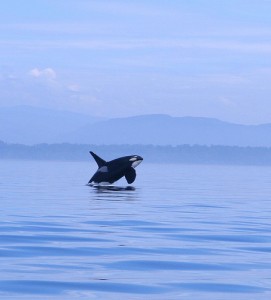We have much more to do and your continued support is needed now more than ever.
Continuing the Fight to Save Orcas in the Pacific Northwest
Today, less than 90 orcas live in Puget Sound. Known as Southern Resident Orcas, these cetaceans rely on salmon and other fish for their primary source of food. The population is not stable, dipping down by 30% over the last 20 years. These endangered orcas are increasingly threatened by declining salmon runs, habitat loss and toxic pollution.

A New Threat from Coal Export Terminals
But now the very survival of orcas in the Pacific Northwest is at risk from fast-moving proposals to export our domestic coal reserves through the waterways of the northwest and across the Pacific Ocean to power coal burning factories overseas. The uncontrolled pollution from burning coal worsens climate change and rides the prevailing winds back to the cool and clean waters of Oregon and Washington.
Faced with stagnant demand for coal in the U.S., some of the world’s largest coal companies want to increase their profits by shipping millions of tons of dirty coal per year through the Pacific Northwest to China and other Asian nations. The coal companies are working hard to gain approval for several giant coal export terminals to be built off the coasts of Washington and Oregon where orcas, salmon and steelhead live.
The proposed terminals would receive massive amounts of strip mined coal coming by uncovered rail through sensitive wildlife habitat areas like the Columbia River Gorge and Glacier National Park. The increased train and tanker traffic, air and water pollution from diesel and coal dust, carbon pollution that fuels climate change, and disturbance of wildlife habitat combine to make these proposed coal terminals some of the most environmentally threatening projects in the country.
Local Communities and Tribal Leaders are Voicing Concerns
Right now, a sliver of light is shining on how devastating coal export terminals could be for orca whales as local momentum is building to stop this expansion of dirty coal.
In July, more than 50,000 wildlife advocates signed a petition, voicing their opposition to proposals for three of the proposed coal export terminals. And earlier this month, Washington State’s Department of Ecology mandated a sweeping environmental review of one of three proposed coal export projects.
The Lummi Nation, the original inhabitants of Washington’s northernmost coast and southern British Columbia, have voiced their unconditional and unequivocal opposition to the terminal proposed for Cherry Point, Washington and called on the U.S Army Corps of Engineers to “carry out its trust responsibilities” (pdf).
Speak Up for Pacific Northwest Wildlife
We can help protect orcas from dirty coal by calling on our congressional leaders to take a stand and speak out in opposition to the proposed coal export terminals in the Pacific Northwest.
Washington Senator Maria Cantwell plays an important role in the politics of coal exports as Chairwoman of the Senate Committee on Indian Affairs. By urging her to voice public opposition to the proposed Washington coal export terminal, you can help stop this coal pollution threat dead in its tracks and promote the recovery of the orca for generations to come.
Every day coal companies are working to move their projects forward quickly and putting intense public pressure on elected officials. It is crucial that Senator Cantwell knows we stand by her and that we urge her to safeguard orcas from dirty coal.
![]() Help protect Puget Sound orcas by urging Washington’s Sen. Maria Cantwell to oppose dirty coal terminals in the Pacific Northwest.
Help protect Puget Sound orcas by urging Washington’s Sen. Maria Cantwell to oppose dirty coal terminals in the Pacific Northwest.





















